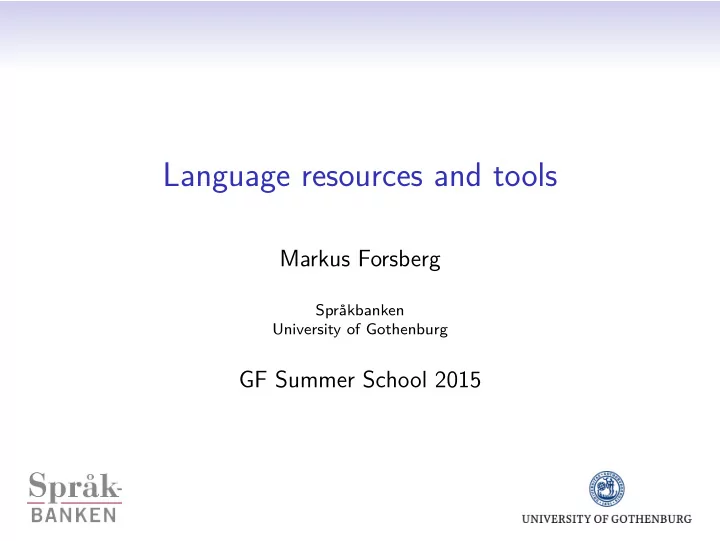

Language resources and tools Markus Forsberg Språkbanken University of Gothenburg GF Summer School 2015
Today’s talk • Language resources and tools at Språkbanken (the Swedish language bank). • A quick introduction to Corpus Workbench. • Demonstration of some of Språkbanken’s tools.
A couple of years ago: Legacy systems at Språkbanken • Språkbanken has been around since 1975. • Service unit for linguists ⇒ LT research unit. • The old way to fly: a language resource = database + interface • The structure of the LR was largely irrelevant (as long as everything looked nice in the interface). • Made linguists (somewhat) happy, and LT researchers unhappy.
Legacy systems: konk and ORDAT, . . .
. . . Parole/SUC and Konkplus, . . .
. . . ITG and Litteraturbanken, et cetera, moreover . . .
. . . Dalin and Old Swedish, . . .
. . . SALDO and SweFN, et cetera, et cetera
What to do?
Changing the situation • Put the resources in the center, not the interfaces ( downloadable resources in a common format, so far IPR permits) • Centralize and think in term of research infrastructure (= technological solutions that try to enable as much new research as possible) • Korp – corpora infrastructure • Karp – lexical infrastructure • Link all the resources to a pivot resource (GF speak: a lexical abstract syntax), SALDO; that is, create a large LT resource network (a macro-resource).
SALDO • SALDO is a full-scale ( ∼ 130k word senses, 2M word forms) lexical-semantic resource for Swedish with semantic relations between all word senses (including MWE). • Available under an open license: CC-BY. • SALDO is a directed graph with so called primary and secondary relations. • The fundamental unit is the word sense (the first version of SALDO did only contain word senses). • All word senses is given one or more formal descriptions, referred to as lemgrams (lemgram=paradigm+lemma → inflection table)
SALDO “PIDs” • SALDO has id’s for: • senses ( grad..1 ) • lemgrams ( grad..nn.1 ) • parts of speech ( nn ) • paradigms ( nn_3u_film ) • the id’s are designed to be • unique (no other id’s should be necessary, e.g., database keys) • atomic (no built-in assumptions about sense–subsense relationships, etc.) • usable in Semantic Web formalisms (RDF, OWL): id’s are well-formed XML names • human-readable (makes resources easier to work with)
Details about SALDO • All (except a few) have a obligatory primary descriptor , and an optional set of secondary descriptors . • 41 senses lack primary descriptor, joined together with an artificial zero-sense PRIM..1 (E.g., färg ’color’, ’rak’ ’straight’, tänka ’think’, ...) • A primary descriptor should be semantically close and more central : more frequent, stylistically more neutral, morphologically simpler, and more. • The secondary descriptors help discriminate the sense (no special criteria).
SALDO example: bota ’cure’
Linking backwards in time (I) • Linking SALDO and Dalin (19th century Swedish) is relatively straightforward. • The vocabulary differences are mainly in the compounds, e.g.: • bäfverhund ‘dog used for beaver hunt’ • bäfverhund → modernize → bäverhund → compound analysis → bäver..nn.1+ hund..nn.1
Linking backwards in time (II) • Linking the Old Swedish to SALDO is more challenging. An illustrative example: • bakvaþi fatal accident resulting from a sword being struck backwards without the striker looking in that direction beforehand • Link to what? Accident? Sword? Both? Others?
Korp pipeline: the annotation lab
Korp: the corpora infrastructure
Korp: word picture
Karp
An quick introduction to Corpus Workbench • A database system for querying annotated texts. • Uses regular expressions over attributed words. • Part of the backend of Korp. • Input format:
Corpus Query Language (CQL) • Basic form, a box = word/token [attr=value] • Example: [word="pizza"] • Regular expression: [word="pizz(a|or)"] • Boolean expression: [word="pizz(a|or)" & (pos="VB" | pos="JJ")]
Corpus Query Language (CQL) • Comparisons: =, !=, <=, >=, !<=, !>=, ( ==, !==) [c >= 5] • Sequences of tokens/words [word="älskar"] []{0,3} [word="pizza"] • A longer example "catch|caught" [tag="DT"] [tag="JJ"]* [tag="N.*"] | [tag="N.*"] "was|were" "caught"
Demonstration: overview 1. Korp annotation lab <http://spraakbanken.gu.se/korp/annoteringslabb> 2. Korp <http://spraakbanken.gu.se/korp> 3. Karp <http://spraakbanken.gu.se/karp>
Recommend
More recommend